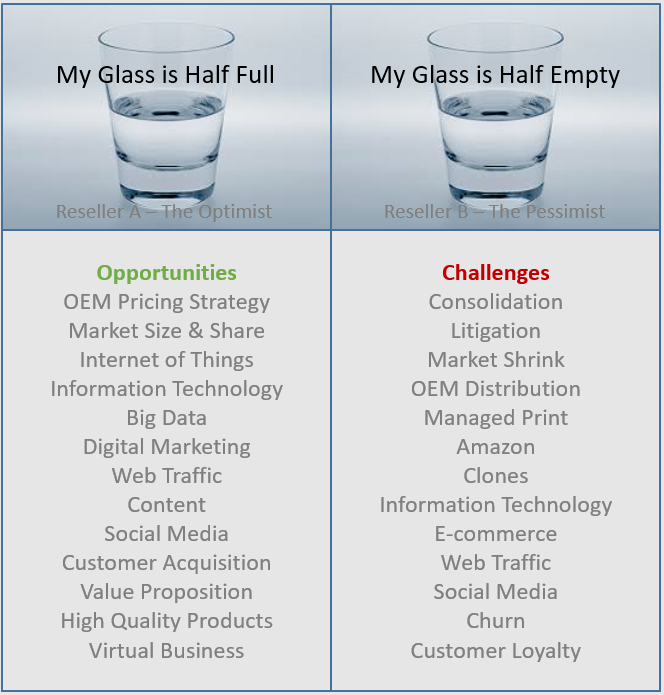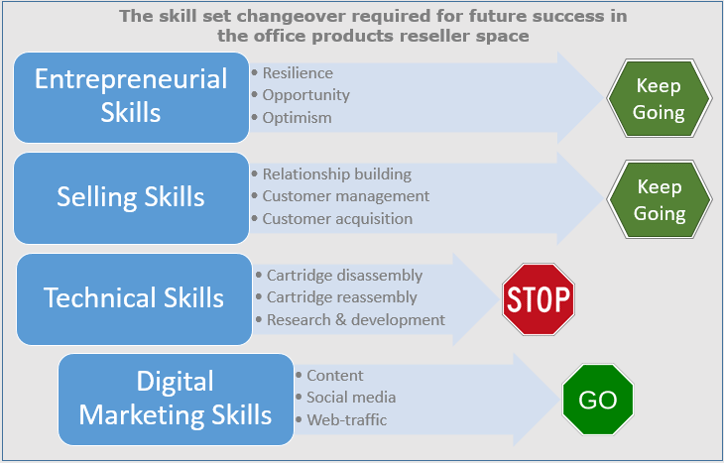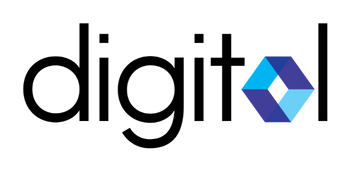For one office products reseller (A), it's possible to feel upbeat about the business prospects; for another (B), it's entirely possible to feel pretty beat-up and pessimistic about the future: the same industry and business model but opposite ends of the spectrum. And, based on what I hear, there's more feeling pessimistic about the outlook than optimistic. Why is this?
Things must feel pretty good for the "glass half-full" guys who see the opportunity to take a piece of a $20B growth opportunity and work diligently to convert customers and prospects off of high-priced OEM cartridges into high-quality aftermarket products.
Things couldn't look much worse for the "glass half-empty" guys, constantly being beaten up with the online pricing, particularly from the Amazon marketplace, a shrinking market, and high churn rates. After 25+ years of hard work, maybe it's time to pack up and give up.
People say there are still 5,000 or more independent resellers in the office products and equipment industry in the United States. Who knows if that number is accurate, but regardless, I think we can safely say there's a large number. So, why is the prevailing mood one of pessimism and uncertainty? Is there a reason for optimism, and should resellers, who may be on the verge of quitting, be thinking differently or not?

Why would there be such a divergence in the outlook of Resellers A and B? If you scan the list of opportunities that Reseller A faces daily and compare it with the list of challenges Reseller B faces, half are the same. Many times, what Reseller A views as an opportunity Reseller B views as a challenge.
Let's go back a minute and recap the origins of the remanufacturing industry and the personas of the individuals that built the industry. In their wildest dreams, do you think the OEMs ever thought they'd be competing with remanufactured cartridges? You can bet your life they didn't! They created their razor and razor blade model, protected the hugely profitable cartridges with a thicket of patents, and pressed the start button!
Well, out of that scenario came hundreds, and then thousands, of entrepreneurs that scoured their local market for empty cores, leveraged the "green" theme, rebuilt and resold them at a lower price than the new OEM cartridges. It wasn't difficult to present a value proposition. After all, the OEM cartridges were (and continue to be) priced at outrageously high levels, it's been an open invitation for the competition to materialize, and so it did.
Now, think for a moment about the persona of the typical individual that entered the aftermarket for ink and toner cartridges 30 years ago and the digital transformation challenges faced. What was the skill set required? Firstly, you had to be an entrepreneur. Secondly, you had to be willing to go out and talk to potential customers, get their empties, and then go back and sell them a remanufactured cartridge, so you had to be a salesman! Finally, you had to be a bit of a techie - disassembling, refilling, reassembling, and testing ink and toner cartridges. There weren't too many manuals on "how-to-do" in the early days, and it took a unique persona to handle this diverse set of requirements.
Now let's fast forward 30 years to the current day and the skill set that's now required. First, of course, the entrepreneurial mindset remains vital. Second, personality and sales capability are no less critical, but third, those techie skills are not needed anymore. Rebuilding cartridges in a local workshop should be (if it isn't already) a thing of the past. It's impossible to deal with the technical and quality issues of today's high-tech and numerous cartridge styles. Gone are the days of one dominant cartridge (SX) in the marketplace and one dominant OEM (HP).
So, the mechanical challenges of disassembly and reassembly have become obsolete in the reseller's persona, and a new requirement has come into play. This new requirement is the internet and mastering digital skills necessary to compete in the new environment.
Unfortunately, the makeup of the original persona is not well-equipped with all the necessary skills for today's market. That old "techie" skill set must go out the window and be replaced with a new "digital" skill set. That means retraining an old mind likely to have some difficulty getting around the difference between (for example) the Kardashian family's social media tactics and those required for an office products reseller to be successful!

It took three skill sets to get started - it's going to take three to continue - it's just that one has changed!
The reality of today's market is very different from the one that existed 30 years ago. The technical and intellectual property challenges have been massive, but the aftermarket manufacturers have responded over the years. Today, the reseller has never been better positioned to present a compelling value proposition, especially compared to those early pioneering days. Resellers should be crushing the OEMs and the big-box retailers, who have no room to move on pricing if forced to defend existing market shares in the face of high-quality competition from the independent reseller channel.
A small emerging group of office product resellers is starting to understand the path to a successful digital and business transformation. These are the ones, while still a minority, who are learning how to see the challenges as opportunities. They are leaving their remanufacturing roots behind, rebuilding the enthusiasm, resilience, and optimism necessary for all successful entrepreneurs, and positioning their businesses for profitable growth.
